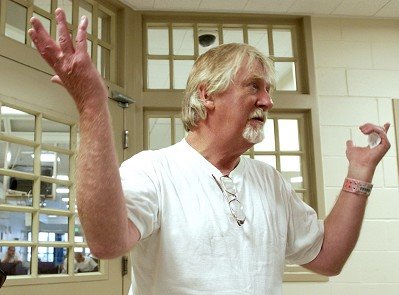Texas sex offenders who are twice convicted of raping children under 14 could get the death penalty under a bill state lawmakers approved Friday.
The state House passed Texas' version of "Jessica's Law," a crackdown on sex offenders who prey on children, a day after the Senate approved it.
The bill is named for Jessica Lunsford, a Florida girl who was abducted and killed. More than a dozen states have passed versions of Jessica's Law.
Gov. Rick Perry has said he was open to the idea of the death penalty in child sex cases and that passage of a child sex offender bill is a legislative emergency. Perry spokeswoman Katherine Cesinger said the governor will wait to read the final version of the bill before deciding whether to sign it into law.
"The purpose is to make Texas a safer place for children and a more dangerous place for their predators," said Republican Rep. Debbie Riddle, the bill's House sponsor.
Texas would be the sixth state to add the death penalty for some child rape cases, although legal experts debate whether the punishment would be unconstitutional in cases where the victim did not die. Louisiana has an inmate on death row in a child sex crime, but that case is being appealed.
Democratic Rep. Lon Burnam called child sex crimes horrendous but said the state that executes more inmates than any other should not expand its use of the death penalty.
Victim advocates have warned that adding the death penalty would do more harm than good if it leads perpetrators to kill victims to avoid leaving witness.
The bill also creates a new category of crime - continual sexual abuse of a young child or children, carrying a minimum penalty of 25 years to life in prison.
Saturday, May 19, 2007
MySpace
MySpace says it will not turn over names of sex offenders to attorneys general
AP
RALEIGH, North Carolina (AP) - MySpace.com said Tuesday it will not comply with a request by attorneys general from eight U.S. states to hand over the names of registered sex offenders who use the social networking Web site.
In a statement, MySpace's chief security officer said state and federal laws prohibit the Web site from sharing such information.
"We are doing everything short of breaking the law to ensure that the information about these predators gets to the proper authorities," the security officer, Hemanshu Nigam, said in the news release.
The statement did not specify which laws MySpace would break by handing authorities the information, and a call to the company was not immediately returned.
In December, MySpace announced it was partnering with Sentinel Tech Holding Corp. to build a database with information on sex offenders in the United States.
Software to identify and remove sex offenders from the site has been used for 12 days, and MySpace has "removed every registered sex offender that we identified out of our more than 175 million profiles," Nigam said.
In a letter Monday, attorneys general from North Carolina, Connecticut, Georgia, Idaho, Mississippi, New Hampshire, Ohio and Pennsylvania asked MySpace to provide the number of registered sex offenders using the site and where they live.
MySpace, which is owned by News Corp., and other social networking sites allow users to create online profiles with photos, music and personal information, including hometowns and education. Users can send messages to one another and, in many cases, browse other profiles.
MySpace's policy prevents children under 14 from setting up profiles, but it relies on users to specify their ages.
AP
RALEIGH, North Carolina (AP) - MySpace.com said Tuesday it will not comply with a request by attorneys general from eight U.S. states to hand over the names of registered sex offenders who use the social networking Web site.
In a statement, MySpace's chief security officer said state and federal laws prohibit the Web site from sharing such information.
"We are doing everything short of breaking the law to ensure that the information about these predators gets to the proper authorities," the security officer, Hemanshu Nigam, said in the news release.
The statement did not specify which laws MySpace would break by handing authorities the information, and a call to the company was not immediately returned.
In December, MySpace announced it was partnering with Sentinel Tech Holding Corp. to build a database with information on sex offenders in the United States.
Software to identify and remove sex offenders from the site has been used for 12 days, and MySpace has "removed every registered sex offender that we identified out of our more than 175 million profiles," Nigam said.
In a letter Monday, attorneys general from North Carolina, Connecticut, Georgia, Idaho, Mississippi, New Hampshire, Ohio and Pennsylvania asked MySpace to provide the number of registered sex offenders using the site and where they live.
MySpace, which is owned by News Corp., and other social networking sites allow users to create online profiles with photos, music and personal information, including hometowns and education. Users can send messages to one another and, in many cases, browse other profiles.
MySpace's policy prevents children under 14 from setting up profiles, but it relies on users to specify their ages.
Subscribe to:
Posts (Atom)
